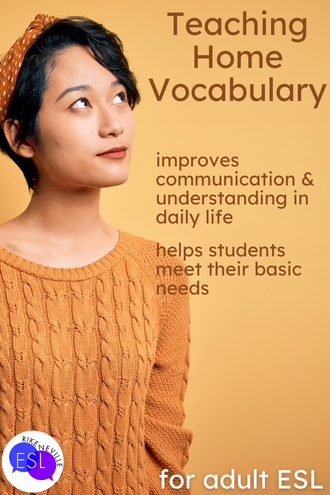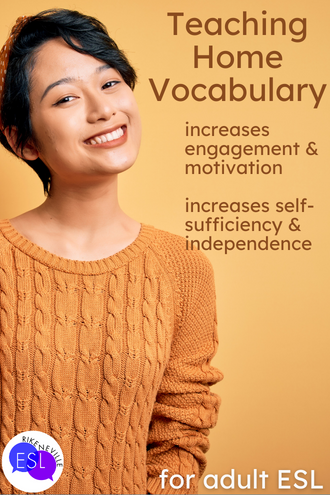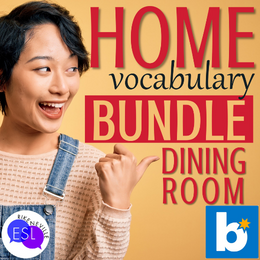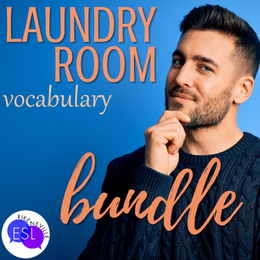Home vocabulary for the win!

Adult ESL teachers understand the importance of providing their students with the tools and resources they need to succeed in both the classroom and everyday life. One way to do this is by teaching home vocabulary, which can be incredibly useful for adult learners navigating a new country and culture.
But perhaps you are new to teaching adult ESL, so let’s explore the importance of home vocabulary for adult ESL students and the benefits it can provide in real-world situations. Keep reading for examples and a room-by-room guide to help you effectively teach this valuable language skill to your students. By incorporating home vocabulary into your lessons, you can help your students feel more confident and comfortable in their new surroundings.
Teaching Home Vocabulary: 6 Benefits for Adult ESL Students

Adult ESL students sometimes feel like they’re trying to navigate a foreign country without a GPS. But teaching home vocabulary to them can be the equivalent of a good old-fashioned paper map (just don’t try to fold it back up). From improving communication and understanding in daily life to helping students meet their basic needs and interact with others, home vocabulary is an essential tool for adult ESL learners. So let’s start with those six benefits!
#1 Home vocabulary improves communication and understanding in daily life
Teaching home vocabulary can have a number of benefits for adult ESL students as they work to improve their communication skills and understanding of their surroundings in their daily lives. For adult students learning a second or foreign language, the home environment can be a particularly important and relevant context in which to learn and practice new vocabulary.
By focusing on words and phrases related to the home, teachers can help students develop the language skills they need to effectively communicate their basic needs, navigate their home environment, and interact with family members and other people they live with. This can improve communication and understanding in the home and provide a foundation for learning and using the language in other contexts and settings. Additionally, teaching home vocabulary can help adult ESL students feel more confident and self-sufficient in their daily lives, as they are able to perform tasks more easily and interact with their environment using the language they have learned.

#2 Home vocabulary helps students meet their basic needs
By learning the names of common household items and appliances, adult ESL students can more easily communicate their basic needs and requests in their daily lives. For example, if students learn the words for common items such as sofa, dresser, and towel, they can more easily express their needs and ask for these items when they are needed. This can be especially important for students who are living in a new environment or culture, as it can help them feel more comfortable and independent in their daily lives.
Having the ability to communicate their basic needs effectively is crucial for adult ESL students as they navigate their new surroundings and try to establish a sense of normalcy and routine in their daily lives. For students who may be struggling with language barriers or feeling overwhelmed by a new culture, being able to express their basic needs can help to reduce stress and increase feelings of autonomy and control.
In addition to improving communication and understanding in daily life, teaching home vocabulary can also help adult ESL students become more self-sufficient and independent. For example, if students learn the names of different household items and appliances, they can more easily perform tasks such as doing laundry, cooking, or cleaning, which can increase their sense of self-sufficiency and contribute to their overall well-being and quality of life.
#3 Home vocabulary helps students interact with family members and other people they live with.
In addition to helping adult ESL students communicate their basic needs and navigate their home environment, teaching home vocabulary can also facilitate communication and understanding between students and the people they live with, such as homestay family members or roommates. If they have children, they can practice and review with their children, who are likely also learning similar vocabulary in school. By learning the names of common household items and appliances, as well as terms related to domestic tasks and responsibilities, adult ESL students can more easily participate in and contribute to household activities and routines.

For example, if students learn the names of common household items such as dish, fork, and spoon, they can more easily set the table and participate in meal times. Similarly, if students learn terms related to domestic tasks and responsibilities, such as laundry, dusting, and vacuuming, they can more easily contribute to household chores and responsibilities and feel more connected and involved in the daily life of their home.
#4 Home vocabulary will enhance additional vocabulary acquisition
Learning home vocabulary can provide a rich source of vocabulary that students can draw upon as they continue to expand their language skills. For example, once students have learned the names of common household items, they can build on this foundation by learning more specific vocabulary related to those items. For example, if a student has learned the word bed, they can then learn more specific vocabulary related to the bed, such as pillow, mattress, and bedspread. This kind of vocabulary expansion can help students to become more fluent and proficient in the language and better able to express themselves in a variety of contexts.
In addition to providing a foundation for learning related vocabulary, teaching home vocabulary can also help students to develop a deeper understanding of the language as a whole. By learning the words for common household items and tasks, students can gain a better understanding of the structure and organization of the language and how different words and phrases relate to each other.
#5 Students have greater engagement and motivation with home vocabulary
When students see the practical value of the language they are learning, they become more motivated and engaged in the learning process. Focusing on home vocabulary allows students to connect the language they are learning to their daily lives and experiences, making it feel more relevant and meaningful. Imagine being able to express your needs and desires with confidence and clarity in your own home. With a strong foundation of home vocabulary, the possibilities for language learning are endless!

But it’s not just about practicality – learning home vocabulary can also be a lot of fun! By connecting the language they are learning to their own personal interests and experiences, students can feel more engaged and motivated in the learning process. For example, if a student is passionate about cooking, they may be more motivated to learn vocabulary related to the kitchen and cooking equipment.
By tailoring the learning experience to students’ individual interests and needs, teachers can help adult ESL students feel more motivated and engaged in their language learning and encourage them to use the language in real-life situations.
#6 Home vocabulary increases self-sufficiency and independence
Increased self-sufficiency and independence are important goals for many adult ESL students, and teaching home vocabulary can be a key component in helping them achieve these goals. By learning the names of common household items and appliances, students can more easily perform a wide range of tasks and activities that are integral to daily life. For example, if a student knows the names of different types of clothing, they can more easily do their own laundry and take care of their own personal grooming. If they know the names of different appliances and tools, they can more easily cook, clean, and maintain their home.
The Importance of Home Vocabulary for Adult ESL Students: Examples of Benefits
Teaching home vocabulary to adult ESL students is crucial for various reasons. For example:

- If a student is renting an apartment, having a good grasp of home vocabulary can help them understand and follow the rules, communicate with their landlord or neighbors, and feel more at home in their new living space.
- If a student is furnishing and decorating their home, having a strong understanding of home vocabulary can allow them to express their preferences, make informed and stylish choices, and create a space that feels like their own.
- If a student is cleaning and maintaining their home, knowing the correct home vocabulary can help them identify and use the right tools and cleaning products and keep their living space clean and organized.
- If a student is living in a new country or culture, having a good command of home vocabulary can help them adapt to local customs and norms, build positive relationships with others, and feel more comfortable in their new surroundings.
- For students with specific home needs or preferences, having a strong understanding of home vocabulary can allow them to effectively communicate their needs and concerns to others, ensuring that they feel comfortable and happy in their living space.
- For students interested in home and interior design, having a good knowledge of home vocabulary can help them expand their knowledge and understanding of the field and improve their creativity and skills.
- For students interested in home and DIY projects, knowing the correct home vocabulary can help them enrich their hobbies and passions and explore new ideas and techniques.

Side Bonus: Gain Insight and Provide Support with Home Vocabulary
As students learn home vocabulary, teachers also gain insight into their students’ home situation and can better tailor learning experiences to their needs. By learning about the layout and design of students’ homes and the tasks and activities they are responsible for, teachers can better understand the challenges and demands that students face in their daily lives. This can be especially important for adult ESL students who may be struggling with language barriers or adapting to a new culture, as it can help teachers identify any areas where students may need extra support or assistance.
In addition to helping teachers tailor learning experiences to their students’ needs, learning about home vocabulary can also help teachers identify any support or resources that students may need. For example, if a student is struggling to understand the language related to a specific household task or appliance, a teacher may be able to provide additional resources or support to help them better understand the material. By learning about students’ home situations and needs, teachers can be better equipped to help students succeed in their language learning and feel more confident and self-sufficient in their daily lives.
The Homefront: A room-by-Room Guide to Home Vocabulary
Toilet Talk: The Importance of Bathroom Vocabulary for Adult ESL Students (No Flushing Required)
Knowing bathroom vocabulary is essential for any adult ESL student, as it can be useful in a variety of practical situations. Here are some examples of how knowing bathroom vocabulary can be helpful for adult ESL students:
Understanding and following rules and regulations: If an adult ESL student is living in a shared living space or rental property, they may be required to follow certain rules and regulations related to the bathroom. For example, they may need to know words like “shower curtain” and “tub” to understand the shower curtain must be closed with the bottom on the inside of the tub when taking a shower.
Communicating with landlords or roommates: If an adult ESL student has any issues or concerns related to the bathroom, they will need to be able to communicate these effectively to their landlord or roommates. For example, they may need to know words like clogged or leak to describe a problem with the plumbing.
Cleaning and maintaining the bathroom: If an adult ESL student is responsible for cleaning and maintaining the bathroom, they will need to know the correct vocabulary for different cleaning tasks and products. For example, they may need to know words like toilet brush for cleaning the toilet, soap scum for cleaning the shower, and chrome for selecting the proper cleaning fluid.
Expressing personal preferences and needs: If an adult ESL student has specific preferences or needs related to the bathroom, they will need to be able to communicate these effectively to others. For example, they may need to know words like “towel” or “toothbrush” to express their preference for a particular type of bathroom accessory. Even prepositions may come into play as they argue their case for why the toilet paper goes over and not under. And it’s OVER. Obviously.
Sweet Dreams are Made of These – Bedroom Vocabulary Words, That Is
Learning bedroom vocabulary is crucial for adult ESL students due to its practicality in various scenarios. The following are examples of how being familiar with bedroom vocabulary can benefit adult ESL students:
Understanding and following rules and regulations: If an adult ESL student is living in a shared living space or rental property, they may be required to follow certain rules and regulations related to the bedroom. For example, they may need to know words like bedspread and mattress to understand the bedspread must be washed regularly and the mattress should be rotated for even wear.
Communicating with landlords or roommates: If an adult ESL student has any issues or concerns related to the bedroom, they will need to be able to communicate these effectively to their landlord or roommates. For example, they may need to know words like thin walls or security light to describe a problem with their sleeping environment.
Cleaning and maintaining the bedroom: If an adult ESL student is responsible for cleaning and maintaining the bedroom, they will need to know the correct vocabulary for different cleaning tasks and products. For example, they may need to know words like vacuum or broom to clean the floor and laundry hamper to collect dirty clothes.
Expressing personal preferences and needs: If an adult ESL student has specific preferences or needs related to the bedroom, they will need to be able to communicate these effectively to others. For example, they may need to know words like pillow or blanket to express their preference for a particular type of bedding accessory. They may also need to know words like window and curtain to describe their preferred level of light and privacy in the room.
Don’t Burn the Toast–Teach Kitchen Vocabulary!
Kitchen vocabulary is vital for adult ESL students. It can be helpful in a variety of practical situations. Here are some instances of how knowing kitchen vocabulary can be useful for adult ESL students:
Understanding and following rules and regulations: If an adult ESL student is living in a shared living space or rental property, they may be required to follow certain rules and regulations related to the kitchen. For example, they may need to know words like trash can and recycling bin to understand the proper way to dispose of waste in the kitchen.
Communicating with landlords or roommates: If an adult ESL student has any issues or concerns related to the kitchen, they will need to be able to communicate these effectively to their landlord or roommates. For example, if the kitchen has a problem with pests, they may need to know words like food storage containers or pest control to describe the problem and request a solution.
Cleaning and maintaining the kitchen: If an adult ESL student is responsible for cleaning and maintaining the kitchen, they will need to know the correct vocabulary for different cleaning tasks and products. For example, they may need to know words like sponge or dish towel for cleaning the countertops and dishes and oven cleaner for maintaining the oven.
Expressing personal preferences and needs: If an adult ESL student has specific preferences or needs related to the kitchen, they will need to be able to communicate these effectively to others. For example, they may need to know words like microwave or stove to express their preference for a particular type of cooking appliance or words like fridge and freezer to describe their preferred storage options for food.
From Throw Pillows to Wall Art, Get Cozy with Living Room Vocabulary
Living room vocabulary is another basic component of home vocabulary that any adult ESL student will find practical and relevant. Keep reading for examples of how knowing living room vocabulary can be helpful for adult ESL students:
Understanding and following rules and regulations: If an adult ESL student is living in a shared living space or rental property, they may be required to follow certain rules and regulations related to the living room. For example, they may need to know words like furniture and decor to understand the rules for placing and arranging items in the living room.
Communicating with landlords or roommates: If an adult ESL student has any issues or concerns related to the living room, they will need to be able to communicate these effectively to their landlord or roommates. For example, they may need to know words like lamp or bulb to describe the problem and suggest a solution for a lighting problem or temperature or thermostat to describe a temperature problem and offer a compromise.
Cleaning and maintaining the living room: If an adult ESL student is responsible for cleaning and maintaining the living room, they will need to know the correct vocabulary for different cleaning tasks and products. For example, they may need to know words like vacuum or duster to clean the floor and furniture and window cleaner to maintain the windows.
Expressing personal preferences and needs: If an adult ESL student has specific preferences or needs related to the living room, they will need to be able to communicate these effectively to others. For example, they may need to know words like couch, sofa, or armchair to express their preference for a particular type of seating or words like television or speakers to describe their preferred entertainment options.
Airing Your Dirty Laundry in Class – Teach Laundry Room Vocabulary
Whether they have a laundry room, a laundry nook, or go to the laundromat, a strong grasp of laundry room-related vocabulary will benefit any adult ESL student. Keep reading for some real-life examples of how knowing laundry room vocabulary can help your students:
Understanding and following rules and regulations: If an adult ESL student is living in a shared living space or rental property, they may be required to follow certain rules and regulations related to the laundry room. For example, they may need to know words like washer and dryer to understand how to use the appliances and words like laundry detergent and fabric softener to understand the proper way to wash and dry clothes.
Communicating with landlords or roommates: If an adult ESL student has any issues or concerns related to the laundry room, they will need to be able to communicate these effectively to their landlord or roommates. For example, they may need to know words like lint trap to complain about it never getting emptied or spin cycle to describe a problem with soggy laundry.
Cleaning and maintaining the laundry room: If an adult ESL student is responsible for cleaning and maintaining the laundry room, they will need to know the correct vocabulary for different cleaning tasks and products. For example, they may need to know words like broom or mop to clean the floor and dehumidifier to maintain the air’s humidity level.
Expressing personal preferences and needs: If an adult ESL student has specific preferences or needs related to the laundry room, they will need to be able to communicate these effectively to others. For example, they may need to know words like iron or steamer to express their preference for a particular type of clothing care appliance or words like hangers or folding board to describe their preferred method of organizing clothes.



In conclusion, teaching home vocabulary to adult ESL students can be incredibly beneficial in a variety of real-world situations. From being able to communicate effectively with roommates or landlords to navigating a hotel or vacation rental, knowing home vocabulary is essential for adult ESL students.
Not only is it important for everyday communication, but it can also help students feel more confident and comfortable in their new surroundings. By breaking down the different rooms of a home and providing examples and benefits of knowing each type of vocabulary, this guide has hopefully provided a helpful resource for teachers looking to help their students improve their grasp of home vocabulary.
Click below for digital task cards hosted on BOOM Learning! All of the BOOM decks in the bundles are also available separately.















Leave a Reply